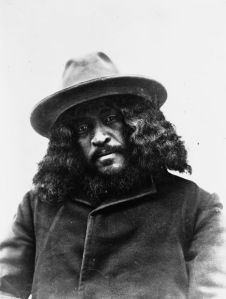Rua Kenana
Rua Kenana’s generation of Tuhoe were the first to have extensive contact with Pakeha, working as labourers for European farmers. This exposure to Pakeha standards of living brought into contrast the deep poverty of Maori, but it also gave the prophet a good understanding of Pakeha skills and ideas, some of which he adopted. He realised that the key was maintaining control of Tuhoe land, and growing Maori wealth so the land could be developed.
Following the example of Moses and the Israelites in the old testament, Kenana established a separatist Maori community at Maungapohatu, in the Urewera, attracting followers from Tuhoe, Ngati Awa and Whakatohea who had been deeply affected by government confiscations of land following the land wars of the 1870s.
When the call came for voluntary admission for the First World War, very few Maori from Tuhoe took up the offer to go and fight for the empire. Part of this was due to hostility to the Pakeha government, but it was also in response to Kenana’s pacifism, derived from the bible and sayings of Te Kooti Arikirangi Turuku. Kenana’s followers believed that war would not reach Aotearoa, and their pacifism, based on the bible, led them to call themselves maungarongo, people of lasting peace.
Publicly suggesting that any man was free to go to war, but strongly discouraging volunteering, Kenana’s resistance came to the attention of Pakeha officials, along with his prophecies that the British would leave Aotearoa, and that Maungapohatu would be visited by the world’s leaders, including the Kaiser of Germany. In effect, Rua Kenana’s reputation as disloyal was a product of war hysteria, and his resistance to the government’s attempts to recruit Tuhoe members of the Maori contingent.
The government, keen to end Kenana’s reign, charged him with selling alcohol to Maori, which was illegal, and fined him. A first attempt to arrest him in February 1915 was unsuccessful, so 67 police officers returned in April 1916. While Kenana forebade resistance, due to his pacifist beliefs, shots were fired. Two Maori were killed, and four policemen and an unknown number of Kenana’s followers were wounded. Rua received a sentence of one year’s hard labour, and the Maungapohatu community was fined over 2000 pounds, effectively destroying the settlement.
Further Reading:
Judith Binney, Gillian Chaplin and Craig Wallace, Mihaia: The Prophet Rua Kenana and His Community at Maungapohatu. Auckland: Auckland University Press & Bridget Williams Books, 1990.
Paul Baker, King and Country Call: New Zealanders, Conscription and the Great War. Auckland: Auckland University Press, 1988.
